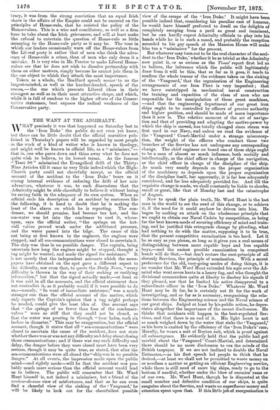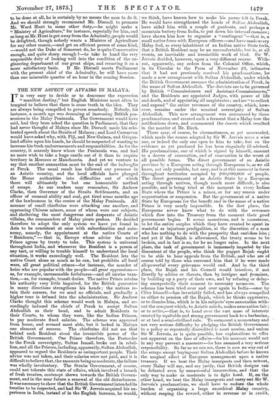THE WANT AT THE ADMIRALTY.
WHAT precisely it was that happened on Saturday last to the Iron Duke' the public do not even yet know, but there can be little doubt that the official narrative pub- lished in Thursday's papers will be regarded by most people • as the work of a kind of writer who is known in theology, and might well be known in official life, as a " minimiser,"— that. is, one who pares down and thins away what he does not quite wish to believe, to its lowest terms. As the famous " Tract 90 " minimised the Evangelical drift of the Thirty- Nine Articles till it came to very little indeed which the High- Church party could not cheerfully accept, so the official account of the accident to the Iron Duke ' bears on it --strong internal evidence of reducing the drift of her mis- adventure, whatever it was, to such dimensions that the Admiralty might be able cheerfully to believe it without losing its saving faith in the adequacy of its own system. When an official- ends his description of an accident by sentences like ,the following, it is hard to doubt that he is making the least of the alarm on which he is reporting. The con- denser, we should premise, had become too hot, and the sea-water was let into the condenser to cool it, where- upon, says the official writer, " the springs on the hot- well valves proved weak under the additional pressure, and the water passed into the bilge. The cause of this not being at first known to the engineer, the engines were stopped, and all sea-communications were closed to ascertain it. The ship was thus in no possible danger. The captain, being uncertain how long the engines might be stopped, thought a tug might be wanted, and made the signal for assistance." It is not merely that the independent accounts which the news- papers have obtained on the spot gave a different aspect to the difficulty, nor even that, to quote the Daily News, "every difficulty is thrown in the way of their seeking or verifying information," but that the signal actually made,—at least so it was said in all the accounts, and the official statement does not contradict it, as it probably would if it were possible to do so,—namely, " In want of immediate assistance," was a much • stronger one than the official account of the matter, which only reports the Captain's opinion that a tug might perhaps be needed, would give the least idea of. One account says that " the springs of no fewer than four of the condenser- -valves " were so stiff that they could not be closed, so that the water was pouring in through " four holes, each six inches in diameter." This may be exaggeration, but the official account, though it states that all " sea-communications " were closed to ascertain the cause of the accident, does not state whether there was or was not any difficulty and delay about closing those communications; and if there was any such difficulty and delay, the danger before they were closed must have been very serious, though it may be quite true, as stated, that after the sea-communications were all closed the" ship was in no possible danger." At all events, the impression made upon the public mind—and rightly made—will be that the accident was pro- bably much more serious than the official account would lead us to believe. The public will remember that Mr. Ward Hunt himself' is, not indeed a minimiser, but a friend of the eaaleur-de-rose view of misfortunes, and that as he can even find a cheerful view of the sinking of the Vanguard,' he will be likely to look out for the cheerfullest possible view of the escape of the ' Iron Duke.' It might have been possible indeed that, considering his peculiar cast of humour, he would have himself preferred to. dwell on the delights of completely escaping from a peril so great and imminent, but he can hardly expeot Admiralty officials to play into his hands while he is in such a mood, and probably the reception accorded to his gay speech at the Mansion House will make him too a "minimiser" for the present. But whatever may turnout to be the real character of the acci- dent to the Iron Duke,' whether it be as trivial as the Admiralty now paint it, or as serious as the Times' report first led us to believe, the inference which the public will legitimately draw from it will be this, that so far as it goes, it tends to confirm, the whole tenour of the evidence taken on the sinking of the 'Vanguard,' that the organisation of the Engineering arrangements of our Iron Fleet is very imperfect ; that we have outstripped in mechanical naval construction the training and capacities of the class of men who are responsible for the manipulation of these great machines, —and that the engineering department of our great iron ships ought to be controlled by officers of greater authority and higher position, and should be made of more importance than it now is. The relative moment of the art of naviga- tion and that of providing and adapting the motive-power by which the ship is moved, has totally changed since steam was first used in our Navy, and unless we read the evidence of the ' Vanguard' Court-Martial under a strange misconcep- tion, the weight of the officers who conduct these two branches of the Service has not undergone any corresponding change. The chief engineer on board one of these ships ought to be a man of almost as much influence, both socially and intellectually, as the chief officer in charge of the navigation, or the chief officer in charge of the discipline of the ship. As much very nearly depends on the proper organisation of the machinery as depends upon the proper organisation of the discipline itself, but apparently, it is far less adequately considered, and far less adequately provided for. And till the requisite change is made, we shall constantly be liable to shocks, small or great, like that of Monday last and the catastrophe of August.
Now to speak the plain truth, Mr. Ward Hunt is the last man in the world to see the need of this change, or to achieve it, if the need for it could anyhow be driven into him. He began by making an attack on the wholesome principle that we ought to obtain our Naval Cadets by competition, as being far the best known-mode of securing efficiency of mind and train- ing, and he justified this retrograde change by pleading, what had nothing to do with the matter, supposing it to be true, that the present competitive examination is too hard. Let it be as easy as you please, so long as it gives you a real means of distinguishing between more capable boys and less capable boys,—and the easiest possible examination in competent hands will do that,—but don't restore the root-principle of all slovenly Services, the principle of nomination. With a secret preference for the old, easy-going modes of doing things, it is no wonder that Mr. Ward Hunt extended his aegis over the Ad- miral who went seven knots in a heavy fog, and who thought the divisional commanders quite at liberty to disobey his signals if they pleased, nor that he limited his active disapproval to a subordinate officer in the ' Iron Duke.' Whatever Mr. Ward Hunt may be fit for, he is certainly not fit for the work of investigating, and so far as is necessary, reorganising the rela- tions between the Engineering science and the Naval science of our great ships. Judged at least by his public action, he depre- ciates altogether the importance of the recent disclosures. He thinks that accidents will happen in the best-regulated Ser- vices, and that there is an end of it. His light heart is not so much weighed down by the water that sinks the' Vanguard,' as his horn is exalted by the efficiency of the 'Iron Duke's' ram. Morally, he wears a sort of Boyton suit, which is proof against all submergence. He evidently held that the public had got morbid about the 'Vanguard' Court-Martial, and determined there should be no more disclosures to vex the minds of the British taxpayer: If we are not inclined to double the Naval Estimates,—as his first speech led people to think that he desired,—at least we shall not be permitted to waste money on so needless a matter as getting an efficient Engineering service, while there is still need of more big ships, ready to go to the bottom if needful, whether under the blow of enemies' rams or of our own. Mr. Ward Hunt, though he is disgusted at the small number and defective condition of our ships, is quite sanguine about the Service, and wants no superfluous money and attention spent upon that. If this little job of reorganisation is
to be done at all, he is certainly by no means the man to do it. And we should strongly recommend Mr. Disraeli to promote Mr. Ward Hunt to some other duty,—he might make a " Ministry of Agriculture," for instance, especially for him, and so long as Mr. Hunt is got away from the Admiralty, people would be delighted, though nobody wants a Minister of Agriculture for any other reason,—and get an efficient person of some kind, —would not the Duke of Somerset do, he is quite Conservative enough, and quite sharp enough ?—to take in hand the very responsible duty of looking well into the condition of the en- gineering department of our great ships, and recasting it on a more satisfactory basis. If Mr. Disraeli meets Parliament with the present chief of the Admiralty, he will have more than one miserable quarter of an hour in the coming Session.



































 Previous page
Previous page